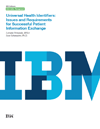
Scott Schumacher, PhD
The healthcare industry is moving toward a future where the electronic exchange of health data will be commonplace. As we enter this new world, there is an increased need to accurately identify an individual across jurisdictions or care-settings so that healthcare providers have a solid foundation for sharing patient health information and providing safer, more cost effective treatment.
A universal health identifier (UHI) has been discussed for years as a method for identifying individuals. UHI proponents point to the many benefits that it delivers to citizens by enabling improvements in healthcare delivery, quality and efficiency. However, now that many countries, such as the U.S., Canada, UK, Singapore and Australia, are well on their way toward implementing national, interoperable healthcare exchanges, there is a renewed debate about whether UHIs are required, or desirable.
Download from eHealthNews.eu Portal: Universal Health Identifiers: Issues and Requirements for Successful Patient Information Exchange (.pdf, 802 KB).
Related news articles:
- IBM Healthcare's Profile
© Copyright IBM Corporation 2010
Initiate and Initiate Master Data Service are registered trademarks in the United States and certain foreign jurisdictions.